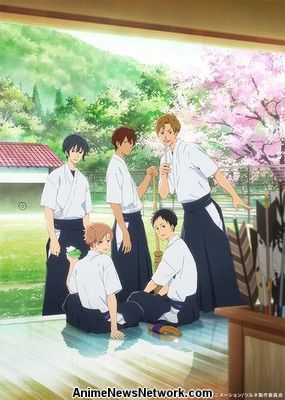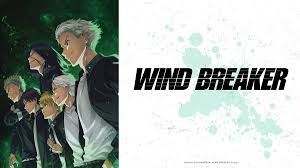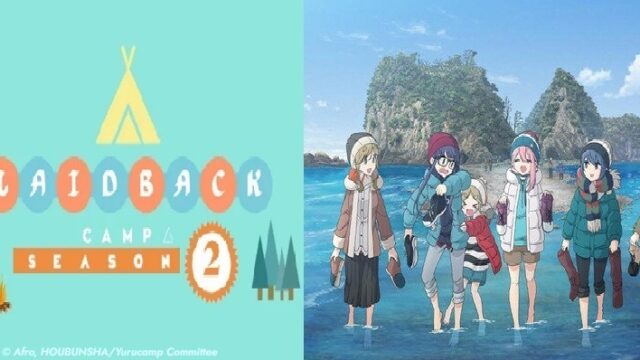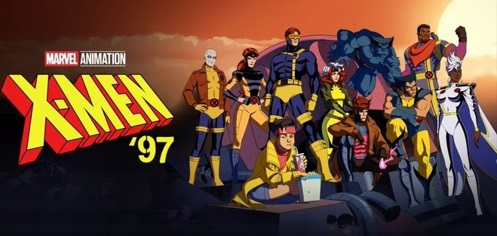English Dub Season Review: Tsurune Season One
Was it a sharp-shooting show in every way?
Spoilers for Season One below!
Sports anime is truly the “boy bands” section of its genre. With a group of male archetypes, shows like this are typically forged on the emotional, interpersonal relationships surrounding the sport of choice. Tsurune follows a teenage boy and his teammates as they struggle to rebuild their school’s kyudo club — learning plenty about themselves, archery, and the power of friendship along the way. Considering the variety of similar shows that use the same formula, is Tsurune worth choosing over something like Free! or Yuri on Ice?
Let’s review.
Animation/Art Style
Considering the show’s slice-of-lifey circumstances (and the fact that kyudo is a pretty peaceful sport) there wasn’t a lot of movement. There was a lot of standing around and a lot of camera-time spent on stoic facial expressions and background details. There isn’t anything about the character art style that jumps out and grabs the audience — on the whole, it’s just pretty generic. There are no defining character features that set it apart from other series. However, Tsurune’s art shines in its backgrounds. No matter what happens in any scene, the beauty of a background sunset, or even just the simple animation of water is pretty remarkable. Details like this are executed beautifully and definitely deserve credit.
Plot
Ever hear of the KISS rule in writing? Here’s a refresher: Keep It Simple, Stupid — and that’s exactly what Tsurune did. But its plot base doesn’t leave much wiggle room, and it winds up being too simple — with nothing too special to make it memorable.
To reiterate, the sports anime genre usually just uses its sport as a backdrop for all the emotional tension that viewers come to see. Tsurune is no different in this light — Minato (the protagonist) must overcome his target panic in order to become the skilled archer he was destined to be. His hesitance is framed by the trauma he faces from his late mother’s death. Surrounding him are his childhood friends (Seiya and Ryohei) and his new teammates (Nanao and Kaito) with whom he learns how to express himself again. Under the training of Masaki (who has his own angsty family backstory) the boys must take steps to find their center and become better people in order to succeed in the tournaments. They do, of course, because it would be way more boring to see them fail in a show that already has a pretty plain plot execution.
There’s a generic story quality that Tsurune has, all stemming from the fact that there seems to be little one can do surrounding a serene form of archery as its driving plot force. It can’t be a driving force if there’s no force — with how relaxed the sport is, it even seems a bit silly that the characters get so worked up over it. Due to this, the show tends to create its own melodrama surrounding the sport, with many of the conflicts going something like this: “I love kyudo.” “But do you really?” “How dare you.”
Characters
This is really the section that a show like this has to rely on. Kyudo won’t keep the attention of the viewer — neither would any sport (because who would turn on a TV and just…watch sports?)
Minato is a well developed character. He goes through quite an arc that showcases how much different of a person he was before his mother’s death (and target panic.) He may come off as boring, but having the episodes be overlaid with scenes from his past start to add a lot more flavor to him than what meets the eye (or tongue.)
Seiya got his own share of development — mainly based around his loyalty to Minato, and having to learn how to be his own person. Something surprising that they didn’t address was how Seiya might have felt about Minato’s mother’s death. Does he feel responsible? Does he experience trauma? Is his dedication to Minato also based on the fact that he wants to make it up to him? These were real questions with answers that would have made things much more interesting.
Ryohei, Nanao and Kaito…really didn’t get the same attention Minato and Seiya did. Granted, Kaito had a lot of great moments where we learn about his character background and start to understand him more, but Nanao and Ryohei aren’t much more than flat character archetypes by the season’s end.
Aside from the Jackson 5 anime boys, there are minor cast members who are really rounded and likable (Masaki) and there are those whose existence is literally unnecessary and even somewhat insulting (as in, every girl member of the team, whose job appeared to be “narrate what the boys are doing.”)
Sound Design
Tsurune is very serene — in its sport and backgrounds, which compliment each other purposely. However, serene doesn’t need to mean silent. The lack of music/SFX makes the world seem flat and makes it hard for the audience to feel involved (if they aren’t already asleep.) Considering that the show’s title is based on a literal sound, one would think that there would be more involvement on the SFX department’s end. There’s the title song, which is exciting and inspiring, but that excitement doesn’t transfer over all the way because of how…peaceful, the show is.
Voice acting wise, a lot of the performances got silly due to dialogue reasons (please, for the love of god, let Kaito say f**k. It is so hard to respect anyone who says “Dang it!” so seriously.) All the voices pretty much matched the tone of the show, though: quiet and calm. However, the lack of variation made it boring to listen to at times — which was a reoccurring problem.
Did it do its genre justice?
There’s nothing wrong with Tsurune — other than the fact that it just doesn’t really do anything special. It’s cohesive, it’s got a fine story with some good characters — but at the end of the day, sports anime is still, in a way, slice of life anime. There may not be a ton of writing room to spice things up, but there are still other aspects that need to be executed well in order for it to be interesting. Yuri on Ice has a ton of movement and effects to dazzle with — and that’s exactly what any sports anime needs to do in order for anyone to invest themselves in the sport as much as the characters do.
It’s not recommendation worthy, but it’s definitely not a bad show. It deserves to shine — there’s a lot of potential and it’d be nice to see where it goes. Granted that budgeting is an issue, perhaps that’s why the season lacks in certain aspects — but there’s still a lot to be done with characters and over-arching plots.
With a successful and rather heartwarming ending, Tsurune’s real tournament may have only just begun. As it shows: it just takes a bit of practice to hit that target.



























Hi Ashley, thank you so much for reading and we love the feedback. Note that on that day we had 14th posts go up and only ten posts show on the front page, so it's possible the preview had already been archived by the time you got to it. One recommendation would be to add our RSS feed to your favorite news aggregator service like Feedly, this way you get all of the latest posts!